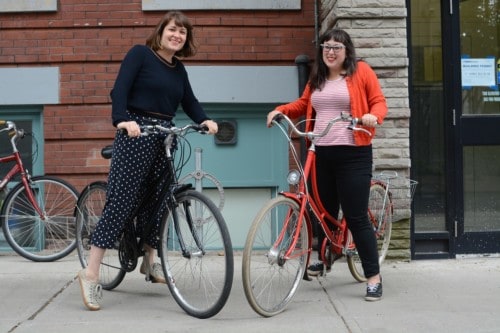“There’s a genuine problem of macho exclusivity when it comes to bike culture,” says Cayley James, who is helping to put together a panel discussion around gender and cycling later this month. “Going into a shop, women are regularly spoken down to and expected not to understand the mechanics of what they’re buying. And everyone has a story. So that is a huge impediment for getting women to ride.”
James, along with Rachel Lissner, decided to dig in to find the most effective ways of getting more women on the road. From fears of safety to education, their upcoming panel discussion and group ride will tackle accessibility, inclusion and increasing participation for women, trans and gender non-conforming riders.
“As a teenager I felt like I was the only one I ever saw riding to school and around the city,” notes James. “I definitely grew up as a defensive cyclist from a young age.” She discovered that other women who are late to the cycling game don’t necessarily feel safe doing it now. “There’s this sensibility amongst people that if you didn’t do it as a kid you’re not going to start now.” This, coupled with a general lack of mechanical know-how, often conspires to keep women off the streets. “I found that being a cyclist made me feel liberated, independent and confident,” adds Lissner. “But many, many women have told me they won’t ride in Toronto until there are bike lanes and more, safer infrastructure.”
Part of that safety piece could include better education and bike programs in schools, from kindergarten on up. “An ideal method would to have a mandatory cycling component for getting a G2,” says Lissner. “Why not include it in the road test? That way people would 1) know what it is like to be around cars 2) know what a bike can do and 3) be motivated to use their cars less.”

Cayley James & Rachel Lissner (photo: Steven Lee/The Varsity)
James advocates making small steps to encourage other women to ride. “It’s as simple as asking the women in your like if they want to go for a ride with you. One-on-one encouragement is key. Start small with recreational rides or bike-pooling to and from work. Or if you know of a great women and trans bike night, take friends along. You have to start small. That’s why groups like Culture Link and Charlie’s FreeWheels are integral to the growth and sustainability of cycling in our city.”
Lissner also believes the city can do more. “Cars are simply out of the question for many people for many reasons,” she says. “So why not serve this large base of potential cyclists and just build what we need? Paint is easy, bike posts are cheap, health goes up and air pollution and noise go down. It’s also just good branding as a city.”
The upcoming panel, Taking the Lane: Gender & Cycling in Toronto, will take place on June 15th at the Parkdale Library, 6:00 p.m.-7:30 PM. Panelists include Alex Legum of Charlie’s FreeWheels, Katie Whitmann Community Cycling Champion and researcher, Lavinia Tanzim of Bad Girls Bike Club and Siva Vijenthira of Spacing Magazine. It will be moderated by Tammy Thorne of Dandyhorse Magazine.
Then on Saturday June 17th, the Women in the Streets ride will take place in the afternoon (1:00 p.m.-3:30 p.m.). They’ll be meeting in Cabbagetown, snaking through the downtown core, and heading east.




 Follow Us On Instagram
Follow Us On Instagram
